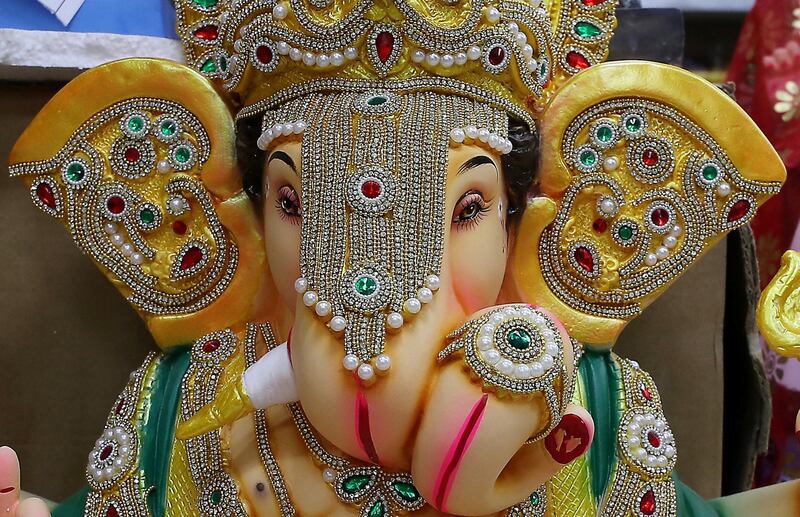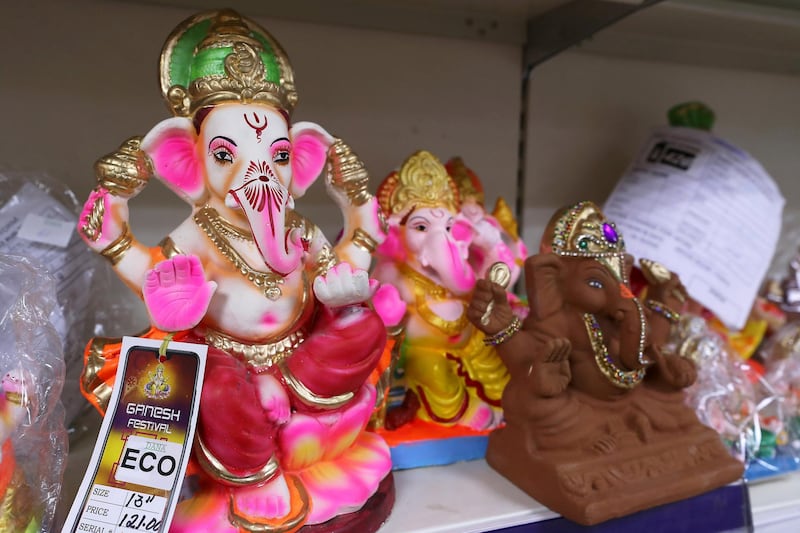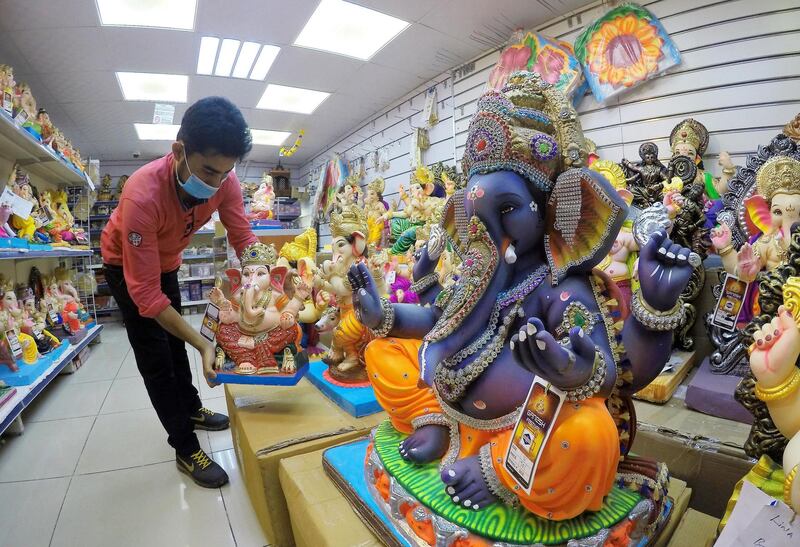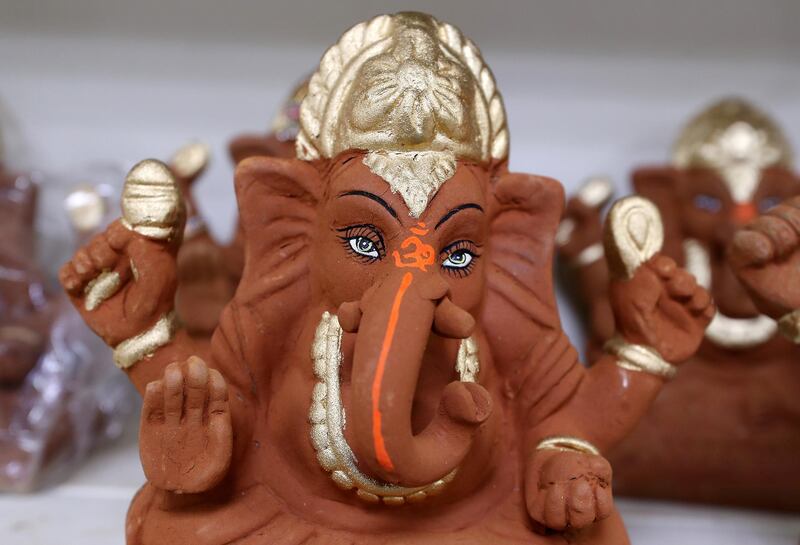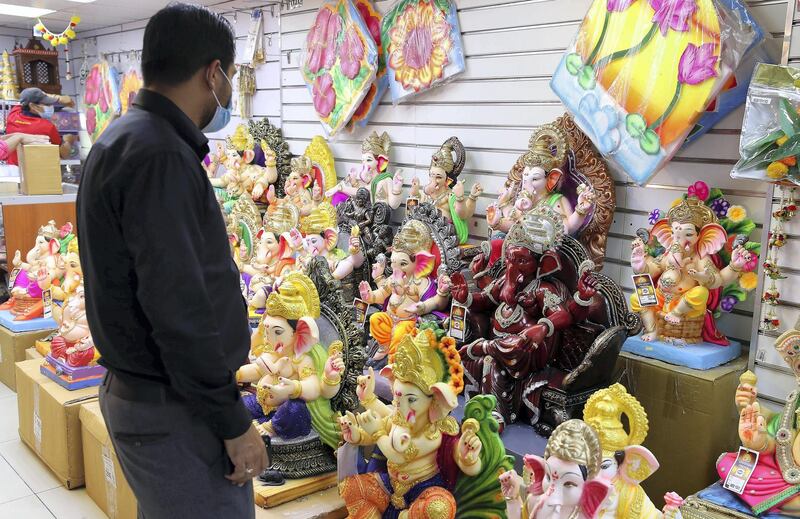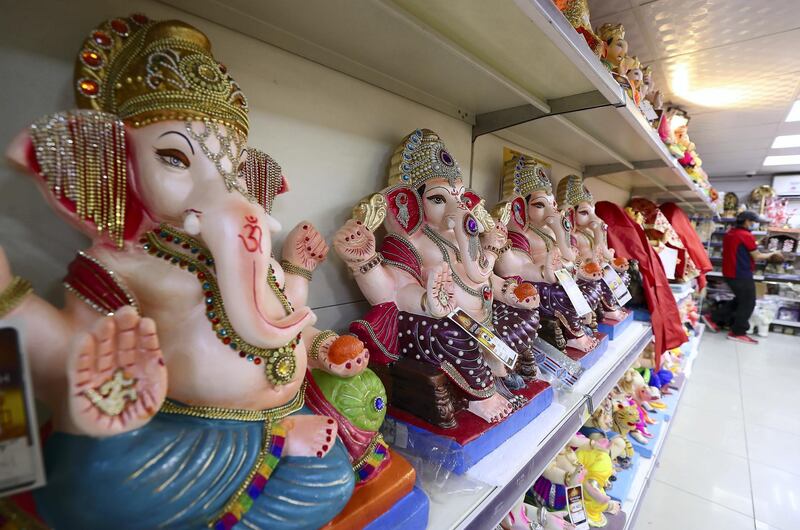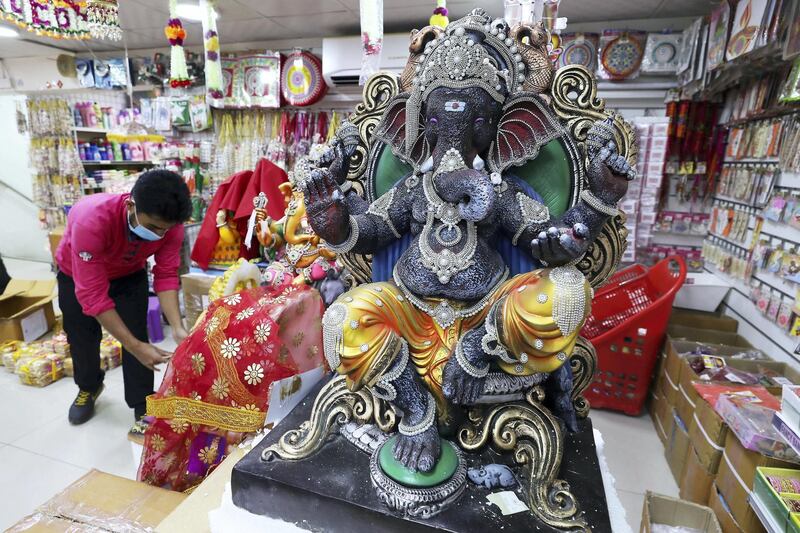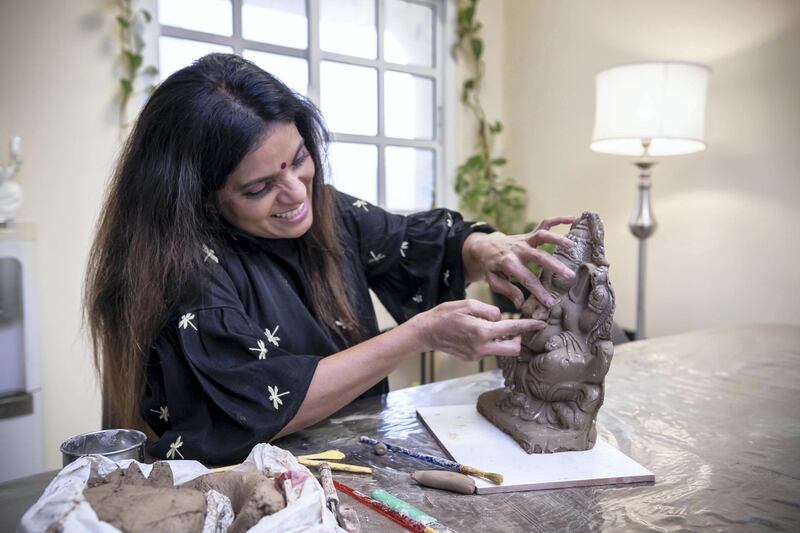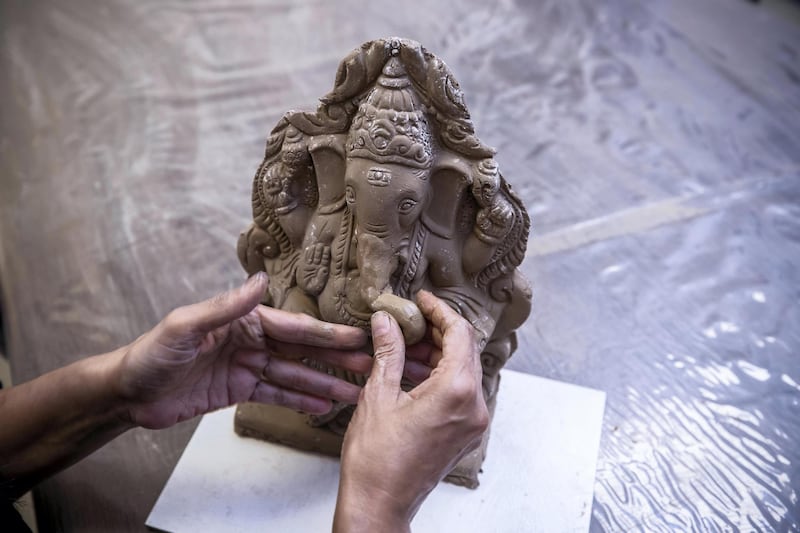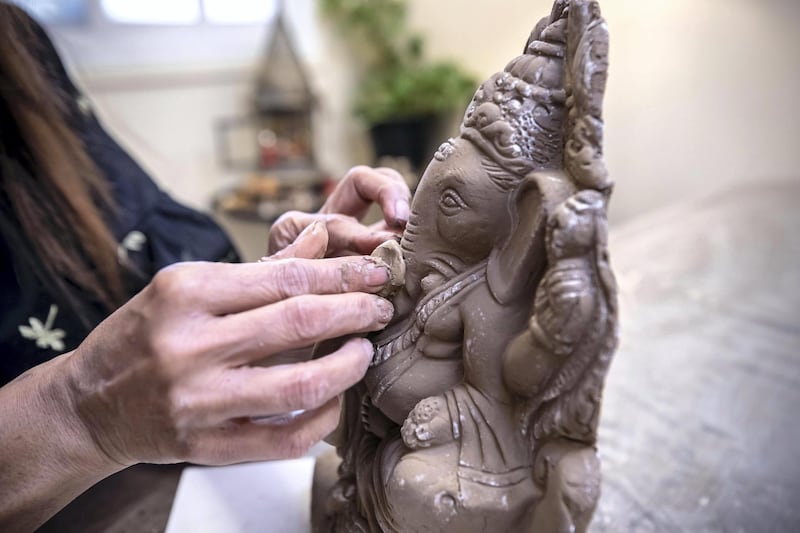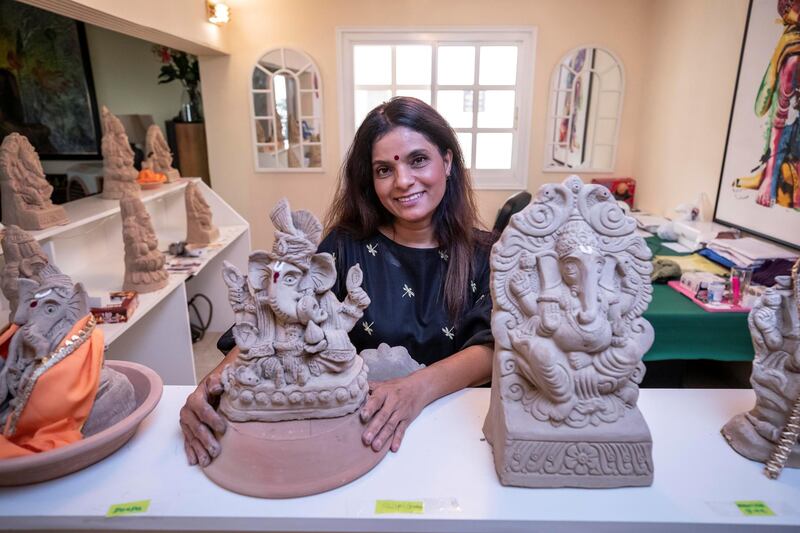Ceremonies to celebrate an annual Hindu festival will be more muted across the UAE this year due to the coronavirus outbreak.
Authorities in Dubai appealed to the Indian community to forgo their usual, more public celebrations, which include submerging an idol of the Hindu god Ganesh, and instead conduct small ceremonies in their homes.
"Due to the pandemic, it will be much safer if people celebrate the festival at home," Omar Al Muthanna, chief executive of the regulatory and licensing sector of the Community Development Authority in Dubai told The National.
He cautioned people to adhere to social distancing guidelines and wear face masks for safety.
Ganesh Chaturthi begins on Saturday. During the 10-day festival, Indians visit homes and temples to pray to Ganesh or Ganpati, the Hindu deity of good fortune, wisdom and prosperity.
Daily prayers and offerings are made before the elephant-headed god.
After worship in homes or community spaces, the idols are traditionally taken in festive processions to nearby lakes or the sea and immersed in accordance with the Hindu faith.
Over the past few years, Indians in the UAE have hired abras or large boats and invited friends and family to participate in the immersion at sea.
Wishing the Hindu community a happy and safe festival, Mr Al Muthanna said guidelines must be followed by those going out for the immersion “to ensure the health and safety of our community and to support the government’s efforts to curb the spread of the pandemic”.
This year, worshippers are being encouraged to use more environment-friendly idols made of mud and clay instead of non-biodegradable material such as plastic, plaster or a mixture of cement and sand.
Think about the planet at Ganesh festival
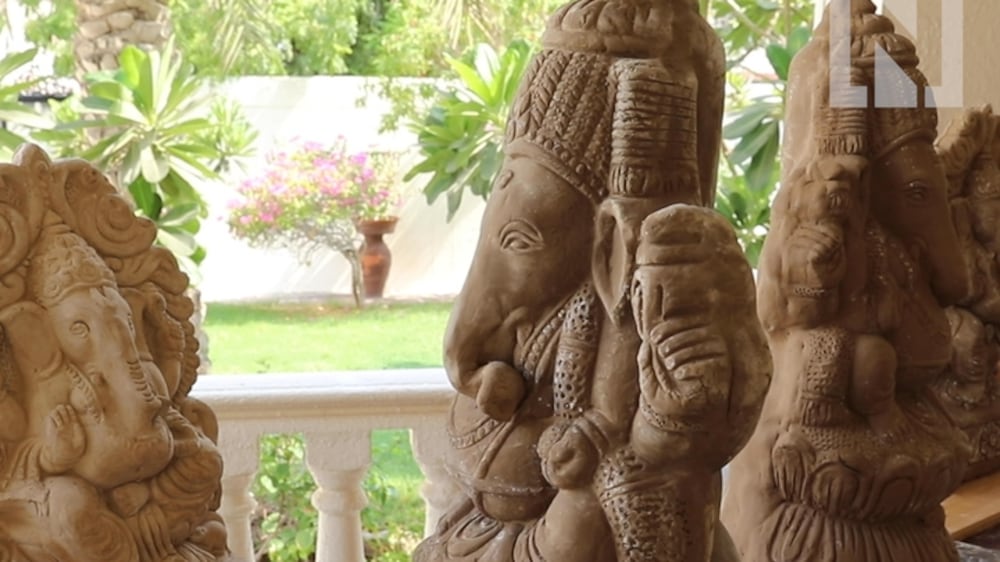
Clay idols can be immersed in tubs at home and the water then emptied into gardens or in potted plants.
“The message is very clear. We are telling people not to congregate near the sea or the creek,” said Raju Shroff, a trustee of the Hindu temple in Bur Dubai.
“We have the support of UAE authorities for our religious activities but this should not be misused.
"We are discouraging large groups from meeting for the visarjan [immersion). The government has been accommodating. But be aware that these are times of covid so you cannot take advantage of the festival and celebrate it on the streets.
"Use biodegradable Ganpatis that are good for the environment. Do the right thing, celebrate in the privacy of your home or in your backyard.”
Savvy Kisan spent days sculpting Ganesh statues from clay in her home in Jafaliya while listening to religious hymns.
In previous years, she carved one or two statues for relatives but, this year, she has received orders for more than 50 clay idols.
“So many people have ordered this year,” said Ms Kisani, who also owns a nursery group.
“Many could not travel to India for the festival and prefer to immerse the Ganpati at home rather than risk going in a group out to sea.”
She uses about 10kg of clay for each piece that are 15 to 50 centimetres tall.
When people arrive to collect the Ganesh idol, Ms Kisani also gives them a flowering plant.
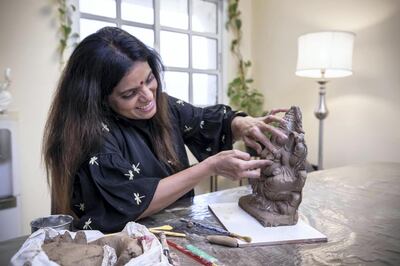
“I’m telling people to please continue doing this in the next years even after the pandemic,” she said.
“Since the eco Ganesha is made of pure clay, it dissolves in water in three to four hours. The clay has nutrients that will help plants flourish.”
Ms Kisani’s creations come with a powerful message since conventionally used materials like plaster do not dissolve easily in water.
Vivid paints usually brushed on to colour idols contain heavy metals including lead and mercury.
“I tell people a statue does not need make up and is beautiful in its natural form,” she said.
“There is already so much pollution. Why disturb marine life that will absorb harmful chemicals and toxic paints when Ganeshas are immersed in the sea?
“Let us be responsible citizens and keep everybody safe. This has been a good year to bring in more awareness of an eco-Ganesh.”
Every year, Prakash Bhatia, owner of Madhoor stores in Bur Dubai and Sharjah, stacks thousands of colourful Ganesh idols alongside Indian spices, rice and lentils in his shops.
Although plaster creations in fluorescent hues dominate the shelves, he said there was an increased interest in the clay versions painted with vegetable dyes.
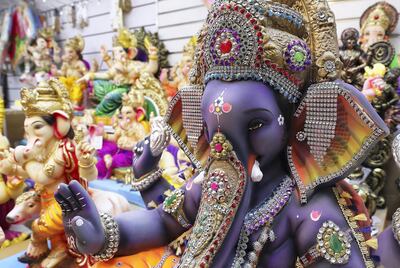
"This year, over 50 per cent are opting for home immersions with eco-friendly Ganesh murtis (statues)," Mr Bhatia said.
“Instead of open houses where everyone is invited to worship, it will be for close family members.
“People are really looking forward to an auspicious festival even if celebrations are on a smaller scale.”
He has asked clients to pick up the statues in advance to avoid crowding a day before the festival.
In India, federal and state governments have appealed against large public festivities.
Cities such as Mumbai typically shut down on the last day of the celebrations, when hundreds of thousands of people pack into lorries carrying towering idols to the sea for immersion.
Next week, authorities in Mumbai have allowed the traditional immersion only for worshippers who reside near the sea, advised indoor celebrations for others and set up artificial ponds for people to submerge the idols.
Much has changed due to the pandemic in the Bhatia home in Sharjah too.
This is the first time the family has chosen a clay Ganesh and plans to stick with the eco-friendly option in the coming years.
Sheetal Bhatia, an art teacher, has decorated her home with gold with the help of her children.
It will be a double celebration with her husband turning 50 on Saturday. Due to work in Oman and travel restriction, he will join the prayers over Zoom calls.
A priest the family typically invites cannot preside over the puja or prayers since he is over 70 years and diabetic.
Ms Bhatia, 46, will turn to YouTube to help conduct the ceremony.
“We usually have about 100 guests visit every day,” she said.
“This year we must take precautions because of Covid-19 so there will be very few people. We celebrate all festivals such as Eid and Christmas so our children know that all religions are equal.
“We will pray for good health and that Dubai and the world returns to normal.”
